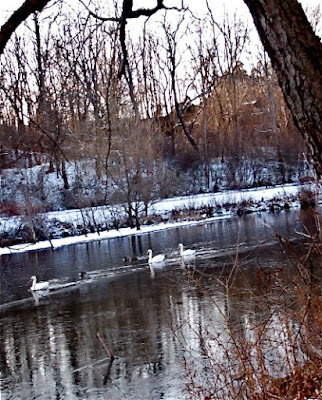 I think the best of
Hopkins’ terrible sonnets is “Carrion Comfort.” Its diction and imagery may be eccentric and
difficult, or even off-putting, but they seem entirely unique to this particular
speaker and this poet, without sacrificing universality.
I think the best of
Hopkins’ terrible sonnets is “Carrion Comfort.” Its diction and imagery may be eccentric and
difficult, or even off-putting, but they seem entirely unique to this particular
speaker and this poet, without sacrificing universality.  Maybe all
who have felt themselves on a psychological precipice at one time or another can feel some connection to "Carrion Comfort," have known something such as Hopkins' sense of betrayal and desertion. He converted to Catholicism and became a Jesuit priest, so it makes sense that his Important Other is his deity. Others have probably felt such abandonment and bullying by different
persons or forces—a lover or parent or friend or employer or system of beliefs and values.
But aren't some of us like this lonely poet in feeling abused, kicked when we are already down, thanks to someone or something we trusted?
Maybe all
who have felt themselves on a psychological precipice at one time or another can feel some connection to "Carrion Comfort," have known something such as Hopkins' sense of betrayal and desertion. He converted to Catholicism and became a Jesuit priest, so it makes sense that his Important Other is his deity. Others have probably felt such abandonment and bullying by different
persons or forces—a lover or parent or friend or employer or system of beliefs and values.
But aren't some of us like this lonely poet in feeling abused, kicked when we are already down, thanks to someone or something we trusted?
CARRION COMFORT
by Gerard
Manley Hopkins (1844-89)
Not, I'll not, carrion comfort, Despair, not feast on thee;Not untwist — slack they may be — these last strands of manIn me ór, most weary, cry I can no more. I can;Can something, hope, wish day come, not choose not to be.But ah, but O thou terrible, why wouldst thou rude on meThy wring-world right foot rock? lay a lionlimb against me? scanWith darksome devouring eyes my bruisèd bones? and fan,O in turns of tempest, me heaped there; me frantic to avoid thee and flee?Why? That my chaff might fly; my grain lie, sheer and clear.Nay in all that toil, that coil, since (seems) I kissed the rod,Hand rather, my heart lo! lapped strength, stole joy, would laugh, chéer.Cheer whom though? the hero whose heaven-handling flung me, fóot tródMe? or me that fought him? O which one? is it each one? That night, that yearOf now done darkness I wretch lay wrestling with (my God!) my God.
After expressing some reservations last time about Theodore Roethke's "In a Dark Time," my main point now is that
the particular details in “Carrion Comfort” feel authentic, not generic. They
are specific to the quirky mind, ear, and eye of Hopkins. The imagery and
phrasing reflect a soul’s chaos and feeling of abandonment by God; perhaps only
Hopkins could have felt it in just this way. If that makes the poem demanding, it also
makes it seem genuine, in spite of all the poetic shenanigans.

Hopkins' language and probably his mind are unusually idiosyncratic, even 120 years after his death, so I hesitate to ask Roethke (last post) or any other poet to match Hopkins' originality or intensity. What I was trying to say about “In a Dark Time” was that a few of Roethke’s images or utterances sounded as if they’d been bought from the poetry kiosk down the street. To the extent that they sound like something many poets would say, or have said, they lose at least a little punch and sense of an honest, unique psyche’s raw cries.
I’ll await responses
before trying to clarify further.
Let me also repeat that I find “In a Dark Time” a good poem and good
Roethke, though not as good as his extraordinary“The Waking”--or “I Knew a Woman” and maybe some
others.







































